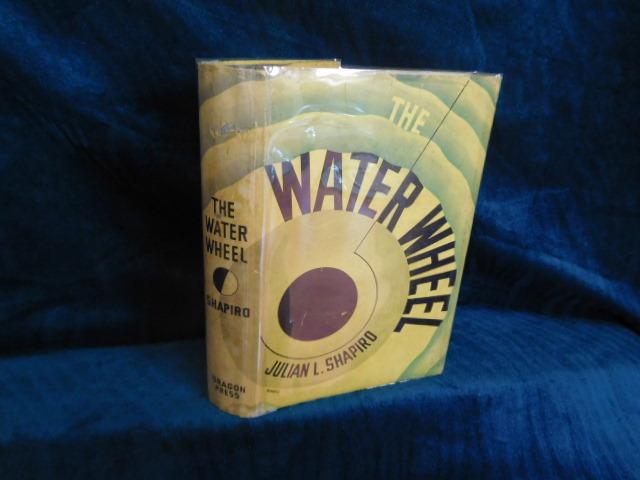
First-ever new edition of The Water Wheel, the 1933 semi-autobiographical debut novel by Julian L. Shapiro, who later achieved cult status writing as John Sanford.
From the original edition's dust jacket:
"The Water Wheel recounts both the real and imagined-real adventures of one John B. Sanford in New York and London over a short period in 1927. The novel is completely dominated by Sanford, a self-assumed individualist--and self-styled 'lawclerk, sinner, ex-convict, adolescent, grandson and legatee of a Litvak matchvendor.'
"The author has maintained a rigid objectivity, at no time intruding upon the narrative, or showing his hand by making Sanford a mouth-piece for the expression of ideas outside the scope of the novel. Notwithstanding the author's neutrality, only the most literal will overlook in Sanford a character definitely in our time.
"In form, The Water Wheel has no counterpart in American letters. It deliberately avoids the traditional, but its objectives are always clarity and simplicity. The many technical and typographical innovations are designed to suit the subject matter, and are not fake-modern tricks."
"This first novel has some effective, even brilliant, scenes. It has originality of language, especially in the projection of moods... verbal brilliance."- The New York Times
"I can't say that I have ever seen better work. It is really written, it moves, it has the quality of a novel. The story as a story bites in, a matter of serious concern to anyone who can think and feel. It is excellent." - William Carlos Williams
"I personally regard Shapiro's novel as the sort of thing that has to come after Joyce, Stein and Surrealism. It is as fine and sensitive at times - if the word were not so utterly damned, I'd say 'as beautiful' - as Virginia Woolf.... In addition, Shapiro is a highly conscious and finished craftsman, which is to say that he is always exceedingly readable."- Samuel Putnam

Julian Lawrence Shapiro was born in Harlem, New York, on May 31, 1904, to a first-generation American mother and Russian immigrant father, who was a lawyer. He obtained his law degree from Fordham University and joined his father's legal practice. While still a law student, Shapiro had a chance encounter with his childhood friend Nathan Weinstein, who was then going by the name of Nathanael West (later known for such works as Miss Lonelyhearts and The Day of the Locust) and working on his first novel. Inspired by West, he ultimately decided to retire from practicing law in order to devote all his time to writing. In 1935, Shapiro adopted the name of The Water Wheel's protagonist, John Sanford, in hopes that, in a time of rising antisemitism in the U.S., a gentile name would aid book sales. In his earlier novels, he was noted for blending experimental techniques with realism. He was described as "perhaps the most outstanding neglected novelist," by The Cambridge Companion to Jewish American Literature. While Sanford's later novels were well received-especially The Old Man's Place (1935), Seventy Times Seven (1939), and his masterpiece The People from Heaven (1943)-The Water Wheel was panned by reviewers when it was released. The Miami Herald was appalled by the sordidness of the novel, tame by today's standards. In a review titled "Sex, Sin, Slime," they wrote, "This is a first novel. It should be the last." and "It is a pity that God's green trees must be sacrificed to provide paper for printing this stuff." The New York Times was a little kinder. While admiring the author's flair and "originality of language," they dismissed the work as "sensitive, neurotic workings of the Sanford mind, with its defensive egotism and pleasure in self-torment-a study in the immature egotist and his inferiority sense." The review concluded, "Mr. Shapiro, with his verbal brilliance, will do better work in a more objective novel." Sanford wrote half of his books after he was 80. He published a five-volume autobiography, for which he received a PEN Award and the Los Angeles Times Lifetime Achievement Award. He left three unpublished novels and was writing up until a month before his death on March 5, 2003, at the age of 98.

No comments:
Post a Comment
Note: Only a member of this blog may post a comment.